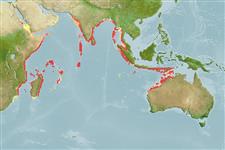Environment: milieu / Zona climática / intervalo de profundidade / distribution range
Ecologia
marinhas; Água doce; estuarina bentopelágico; catádromo (Ref. 51243). Tropical; 23°N - 33°S
Asia: Pakistan, India, Sri Lanka, Burma, and the East Indies. Reported from Nepal (Ref. 9496, 12045) and Bangladesh (Ref. 1479).
Tamanho / Peso / Idade
Maturidade: Lm ? range ? - ? cm
Max length : 200 cm TL macho/indeterminado; (Ref. 85009); common length : 80.0 cm TL macho/indeterminado; (Ref. 4832); peso máx. publicado: 6.0 kg (Ref. 1479)
Descrição suscinta
Chaves de identificação | Morfologia | Morfometria
Raios dorsais (total) : 250 - 305; Raios anais : 220 - 250; Vértebras: 106 - 112. Body elongate, head conical, flattened dorsally. Mouth terminal, lips prominent, narrow bands of teeth on jaws, broad band on vomer.
Body shape (shape guide): eel-like.
Lives in freshwaters, but also occurs in estuaries and in the sea during early life and near maturity (Ref. 4832). Occurs in freshwater streams, pools and reservoirs and commonly found in mud substrates of tanks and in deep rock pools of rivers (Ref. 41236). Most common eel in Indian inland waters. There exists a good export market for both live elvers and eels. Highly prized as food fish because of its nutritional value. Fish mucous from live fish mixed with rice or wheat flour is used as medicine for arthritis (Ref. 44150).
Ciclo de vida ou comportamento de acasalamento
Maturidade | Reprodução | Desova | Ovos | Fecundidade | Larvas
Talwar, P.K. and A.G. Jhingran, 1991. Inland fishes of India and adjacent countries. vol 1. A.A. Balkema, Rotterdam. i-liv + 1-541, 1 map (Ref. 4832)
Status na Lista Vermelha da UICN (Ref. 130435: Version 2024-2)
Ameaça para os humanos
Harmless
Uso pelos humanos
Pescarias: espécies comerciais; Aquacultura: uso futuro provável; peixe esportivo: sim
Ferramentas
Relatórios especiais
Baixar XML
Fontes da internet
Estimates based on models
Preferred temperature (Ref.
123201): 26.2 - 29.3, mean 28.3 °C (based on 292 cells).
Índice de diversidade filogenética (Ref.
82804): PD
50 = 0.5000 [Uniqueness, from 0.5 = low to 2.0 = high].
Bayesian length-weight: a=0.00076 (0.00037 - 0.00157), b=3.17 (3.00 - 3.34), in cm total length, based on LWR estimates for this Genus-body shape (Ref.
93245).
Nível Trófico (Ref.
69278): 3.8 ±0.7 se; based on size and trophs of closest relatives
Resiliência (Ref.
120179): Muito baixo(a), tempo mínimo de duplicação da população maior que 14 anos (Preliminary K or Fecundity.).
Fishing Vulnerability (Ref.
59153): Very high vulnerability (90 of 100).
🛈
Nutrients (Ref.
124155): Calcium = 25.7 [12.9, 56.8] mg/100g; Iron = 0.5 [0.3, 0.9] mg/100g; Protein = 18.2 [16.3, 20.3] %; Omega3 = 0.246 [0.109, 0.567] g/100g; Selenium = 184 [71, 424] μg/100g; VitaminA = 20.6 [3.6, 106.6] μg/100g; Zinc = 0.956 [0.596, 1.561] mg/100g (wet weight);
